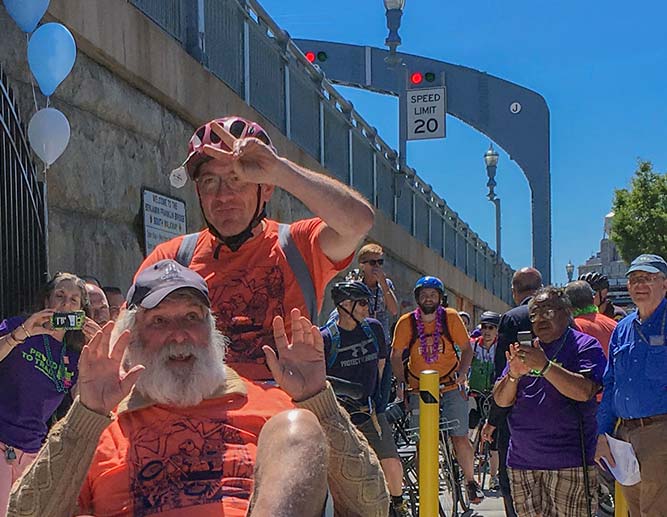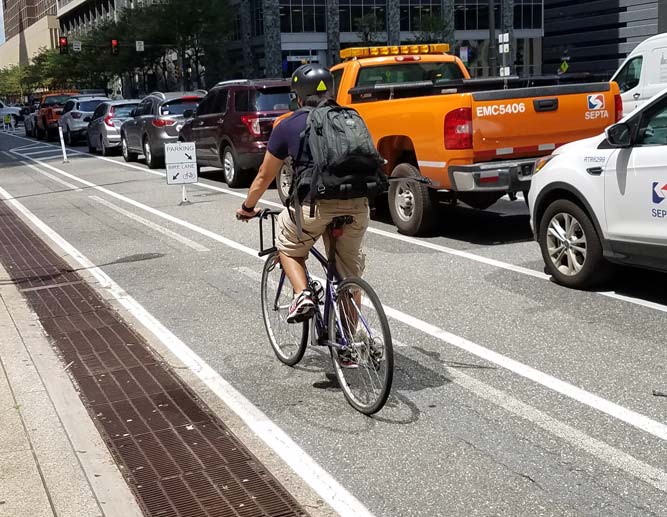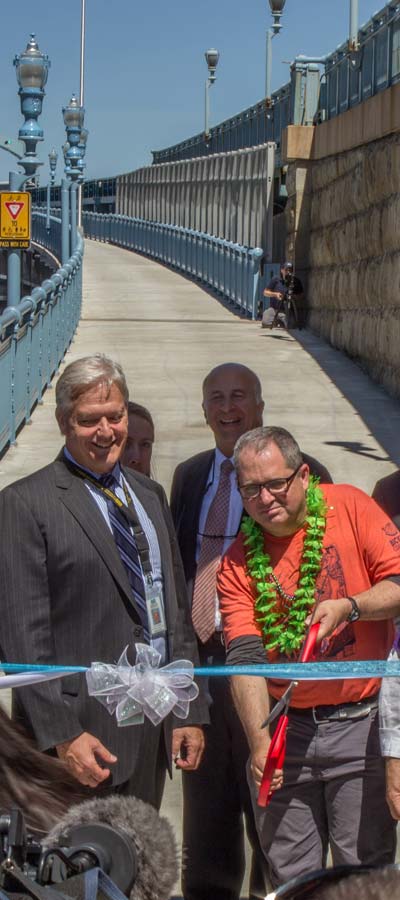
Ben Franklin Ramp
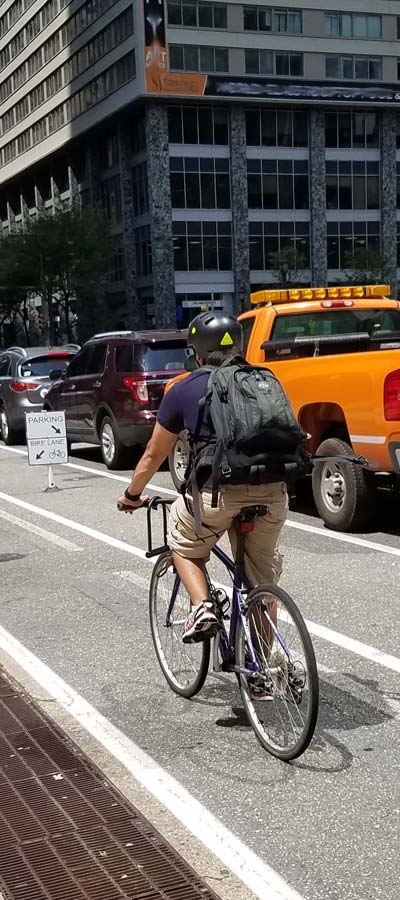
JFK & Market
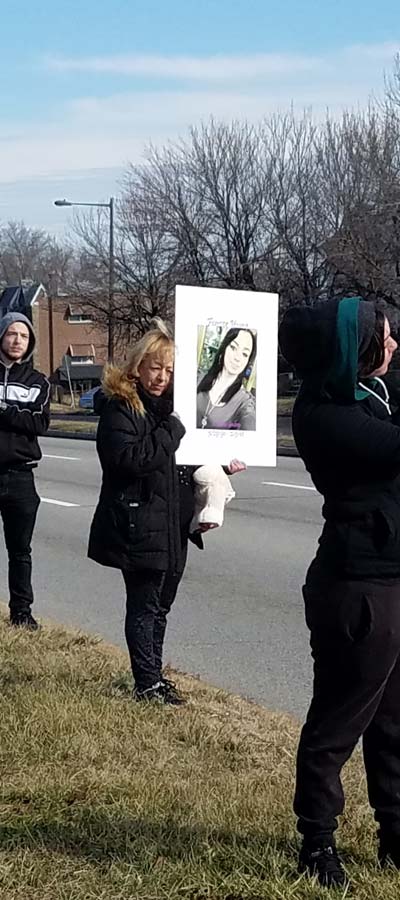
Roosevelt Blvd
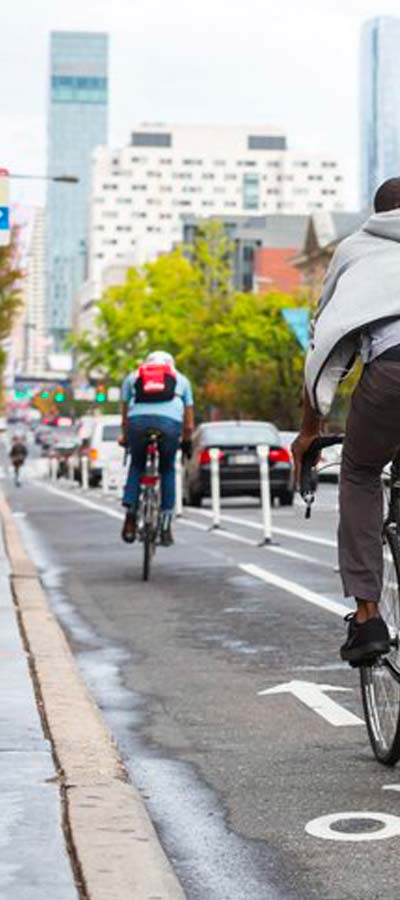
W. Chestnut
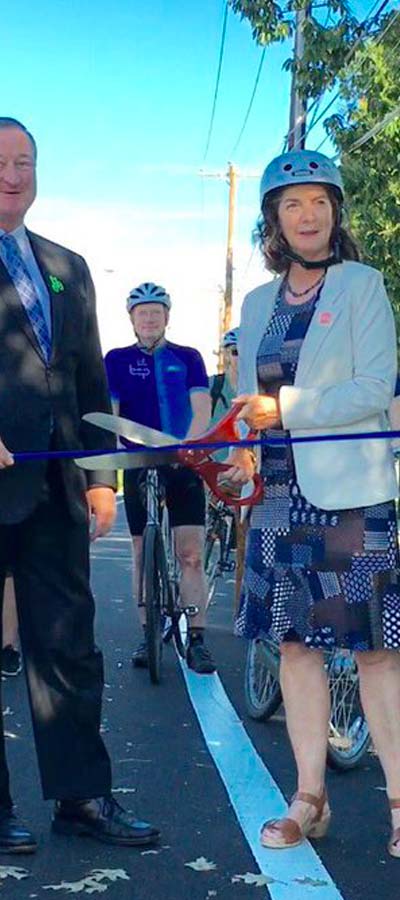
1st protected lane
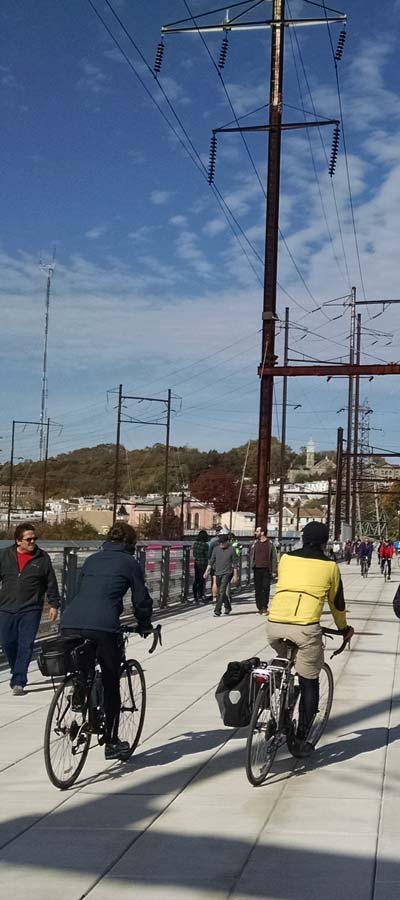
Manayunk Bridge
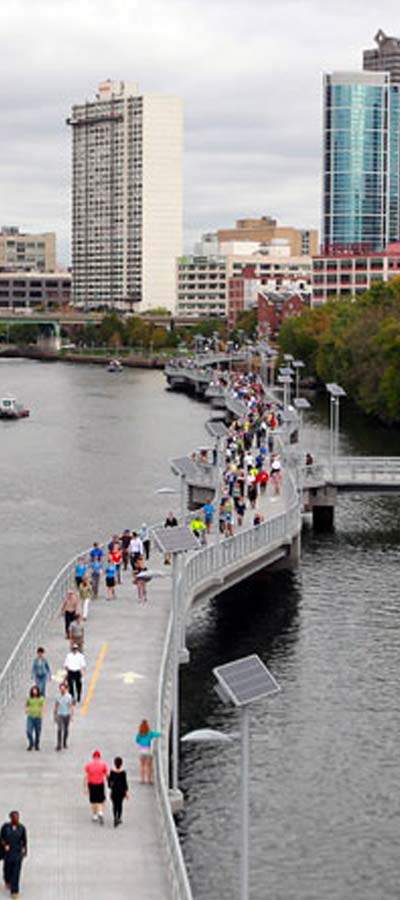
Schuylkill Banks Boardwalk
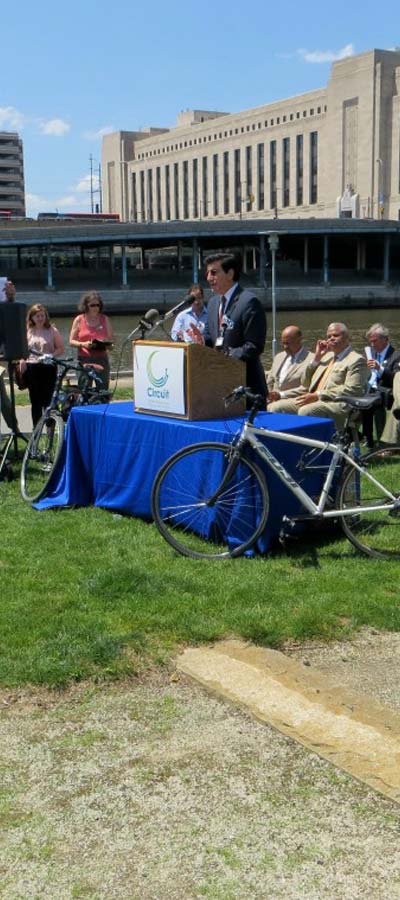
Circuit Trails
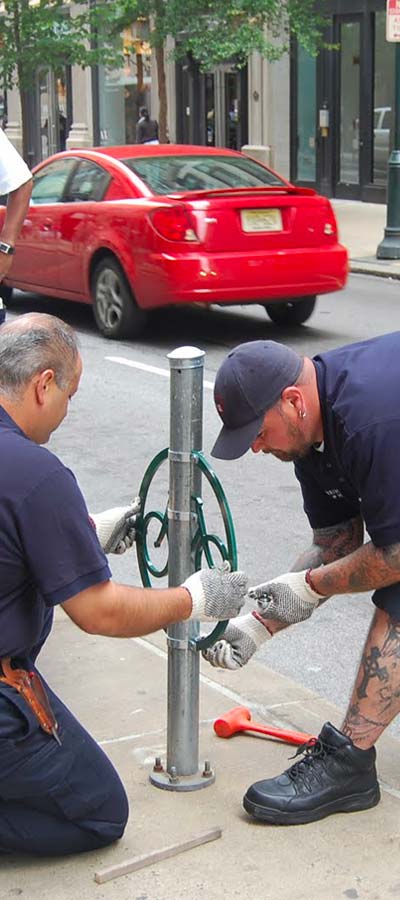
Meters, Transformed
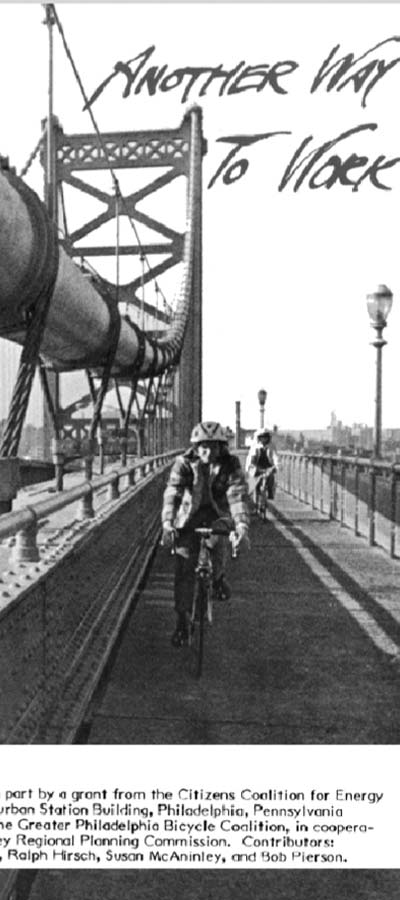
Bikes Allowed
FOLLOW US
OUR VICTORIES
Automated Speed Enforcement
HB 1284 was passed by the PA State Senate and concurred by the PA House of Representatives. It then went to the Governor’s desk and was signed Friday, December 15th into law. The amended bill that passed makes the current Automated Work Zone Speed Enforcement program and Roosevelt Boulevard program permanent, adds driver protections to those programs and the School Bus Arm Encroachment. It also adds 5 more permanent roads to the Roosevelt Boulevard program and allows the City of Philadelphia to create School Zone Speed Camera pilots in 5 locations for at least 5 years.
Wins for Protected Bike Lanes
The longest protected bike lane in the City opened in October (Chestnut St, 3.3 miles), and the longest-debated protected bike lanes opened in late summer of ‘22 on eastern Washington Ave. Protected bike lanes were also added to 10th St, 15th St, Belmont Ave, and Grays Ave. In August, the Circuit Trails Coalition hosted a press event for the announcement of new funding committed to the project: the City of Philadelphia, PA DCNR, and the William Penn Foundation each committed funding to cover the cost for design, engineering, and Phase I of the project.
Lil' Safety Village
Hunting Park is now home to the region’s first traffic park where kids and adults alike can practice riding bikes in a colorful, car-free space. We ramped up programming at the Lil’ Philly Safety Village spring of ‘22 with free kids’ learn to ride classes plus free bike & helmet rentals.
MLK Drive opened to people
On March 19, 2020, during the very first week of the City’s COVID-19 mitigation efforts, we called for the opening of MLK Drive to cyclists, pedestrians and other trail users to address the increased demand for safe outdoor space. And on March 20, Mayor Kenney did just that. With a combined trail and road width of 50 feet, MLK has about 4 times the breathing room of the other river trails (Kelly Drive path and Schuylkill Banks), which not only made it a prime spot for social distancing, but also for a wide
variety of recreational uses for folks of all ages and abilities.
Ben Franklin Bridge ramp opens
After more than 10 years of advocacy efforts, the Delaware River Port Authority Board of Commissioners unanimously approved the contract for the construction of a walkway ramp on the south side of the Ben Franklin Bridge’s Camden approach—replacing its existing, 3-flight-high stairwell. The Bicycle Coalition’s founder John Dowlin was the first to use the ramp.
JFK & Market protected bike lane project
Mayor Jim Kenney announced that the city would finally undertake protected bike lane improvements along JFK Boulevard and Market Street, between 15th & 20th Streets, at the Bicycle Coalition of Greater Philadelphia’s Vision Zero Conference. These extraordinarily wide roadways had been a target of the Coalition’s advocacy for years, and this announcement was a welcome one.
Speed cameras for Roosevelt Boulevard passes state legislature
After years of organizing trips to Harrisburg, meetings, press conferences, letters and phone calls and working with Latanya Byrd, the aunt of four victims of a horrific 2013 crash on Roosevelt Boulevard, the Pennsylvania Legislature finally passed legislation allowing a five year pilot of automated enforcement cameras on Philadelphia’s Roosevelt Boulevard
West Chestnut Street gets a protected bike lane
In June, after six years of advocacy by the Coalition, City Council approved a protected bike lane along West Chestnut Street, between 45th & 34th Streets.
Pennsylvania’s Bikeway Occupancy Permit is abolished
In May, 11 years of the Coalition’s advocacy finally paid off as PennDOT eliminated the Bikeway Occupancy Permit (BOP) and replaced it with Bike Lane Requests/Approval Letters. The BOP, which had been law, required municipalities (outside of Philly & Pittsburgh) that wanted a new bike lane to bear the burden of maintaining any bikeway along a PennDOT right-of-way, discouraging small cities and towns from installing bicycle infrastructure.
Mayor Kenney signs Vision Zero Executive Order and hires first Director of the Office of Complete Streets
Through an executive order, Mayor Jim Kenney formally committed to a Vision Zero policy to eliminate traffic deaths by 2030 and created a new Office of Complete Streets dedicated to re-engineering streets according to Vision Zero standards, both of which were proposed by the Bicycle Coalition of Greater Philadelphia and our partners in the Better Mobility report.
Sullivan’s Bridge opens
On August 19th, after decades of delay, a dedicated pedestrian & cycling bridge opened across the Schuylkill River, restoring a safe route between Valley Forge and the Schuylkill River Trail.
Philadelphia’s first protected bike lane on Ryan Avenue opens
On September 28th, the City of Philadelphia opened the first parking-protected bike lanes along Ryan Avenue, an important step to continue improving this area’s cycling infrastructure.
Red Light Camera Law Reauthorized for 10 years
Our advocacy, in partnership with Channabel Morris-Latham, the mother of Jamal Morris who was killed by a hit and run driver, led to the renewal of legislation to allow municipalities to install red light cameras, generating revenue for low cost safety improvements throughout the state.
Manayunk Bridge Trail opens
In October 2015, the iconic Manayunk Bridge — a former rail bridge from Montgomery County to Philadelphia, over the Schuylkill River — reopened as a bike/ped-only bridge.
Mayor-elect Jim Kenney adopts Vision Zero policy
Mayor-elect Jim Kenney committed to building 30 miles of protected bike lanes and bringing traffic deaths down through a Vision Zero policy, two key policy initiatives advocated by the Bicycle Coalition during the 2015 primary.
Indego Bike Share Launches
In April 2015, Philadelphia got its first bike sharing system: Indego Bike Share. The Bicycle Coalition of Greater Philadelphia is collaborating with the city on the Better Bike Share Partnership, a program to help bring bike sharing to neighborhoods outside of Center City.
Schuylkill Banks Boardwalk opens
Philadelphia built out the Schuylkill Banks Trail in fall 2014 by connecting the trail to the South Street Bridge via a new boardwalk on the water. This boardwalk provides a new pathway for cyclists to get through west Center City without having to ride on city streets.
Delaware Valley Regional Planning Commission commits to build out the Circuit by 2040
The Circuit Trails were incorporated into the Commission’s Connections 2040 Long Range Plan,the first time a regionally significant bicycle pedestrian project had been called out as a regional priority.
The Circuit Trails network launches
With the backing of the William Penn Foundation, we helped found The Circuit Coalition, a collaboration of non-profit organizations, foundations, and agencies working to advance completion of a connected network of trails – the Circuit Trails – across the Greater Philadelphia region.
Philadelphia Parking Authority and Mayor Michael Nutter convert 1,500 meter poles into bike racks
When the Philadelphia Parking Authority removed coin parking meters during its conversion to payment kiosks, it jeopardized a lot of bike parking. In our 2008 report we had proposed converting the retired meters into back racks. With our encouragement, the City and Parking Authority collaborated on the installation of over 1500 bike rack conversion kits in Center City and University City.
Campaign commitment to build a river-to-river bikeway is fulfilled when Mayor Michael Nutter opens the Spruce and Pine buffered bike lanes
As a result of the exponential growth in Philadelphia’s cycle commuting, we worked with the City of Philadelphia to pilot buffered bike lanes on Spruce and Pine Streets. The lanes were installed on a trial basis in 2009 and the City recommended they be made permanent in 2010.
William Penn Foundation creates a Regional Trail Fund
After the unprecedented TIGER grant, we worked with the William Penn Foundation to help them devise their regional trail grantmaking strategy. As an outgrowth of that effort, the William Penn Foundation created the Regional Trail Fund with a $10 Million capital grant award, followed by additional awards totalling $17.6 million. Since 2010, $292.8 million in local, state, federal and private funding has been awarded for Circuit trail projects.
$23 Million federal grant awarded to Philadelphia and Camden for 10 trail projects
We worked with partners to help Philadelphia and Camden secure a $23 million grant from the federal TIGER grant program (Transportation Investment Generating Economic Recovery) for trails in both counties. Among the projects funded by this grant are multiple segments of the Schuylkill River Trail, the Port Richmond Trail, the improvements in Camden along Pearl, Pine, and MLK Blvd, and the Connector Bridge and Boardwalk at Schuylkill Banks.
Philadelphia city code amended to require bike parking minimums in new construction
As an outgrowth of our advocacy with the Philadelphia City Planning Commission and the Bicycle Pedestrian Master Plan, we worked in City Council to pass an ordinance to require bike parking minimums in new construction.
Bicycling doubles between 2005 and 2008
We began to systematically count bicycles annually in Center City and West Philadelphia in 2005. Our first bike count report “Double Dutch” in 2008 revealed that bike traffic doubled in a three year period. We believe the rise of bicycling in this period was prompted by the completion of the Schuylkill River Trail between the Art Museum and Locust St in 2004.
Bike racks installed on all SEPTA buses
We helped make SEPTA a more bicycle-friendly transit system and encouraged bicyclists to use public transit to complete their journeys by helping get bike racks on all SEPTA buses.
SEPTA drops bike permits
SEPTA’s original policy for allowing bicycles on trains required applicants to buy a $5 annual permit in person during business hours. They later made the permits available by mail. After a long conversation, in 1997 the Bicycle Coalition convinced SEPTA to drop the permit entirely.
Philadelphia Streets Department starts installing bike lanes when resurfacing streets as recommended by City’s first Bicycle Pedestrian Plan
Philadelphia’s first bike lanes are installed, on a half-mile stretch of Delaware Ave (now Columbus Blvd) near the Home Depot. In Northeast Philadelphia, the wide 4-lane Morrell Avenue is reduced to 3 lanes and bicycle lanes are added.
Fairmount Park Commission approves weekend closures of MLK Drive
In 1993, the Fairmount Park Commission agreed to close the West River (now MLK) Drive to vehicular traffic on weekends from 7AM-5PM from April to October, creating a 4-mile-long scenic promenade: ideal for cyclists & pedestrians. In 1995, radio talk show host Mary Mason launched a campaign on her show to end the weekend road closure. Her campaign peaked at boisterous and racially-charged hearings at the Fairmount Park Greenhouse in February of 1995. In the end, the Fairmount Park Commission opted for a partial-closing compromise, proposed by then-Mayor Ed Rendell, to open the lower 1.2 miles at Sweet Briar Cutoff at 12PM. Those hours remain in effect to this day.
Bicycle Coalition members protest the closure of the Betzwood Bridge between the Schuylkill River Trail and Valley Forge National Historic Park
In 1993, PennDOT closed the aging Betzwood Bridge, which had allowed bicycle and pedestrian access between the Schuylkill River Trail and Valley Forge National Park. This spurred a Bicycle Coalition protest which included a civil disobedience display involving the arrest of then-Coalition President Noel Weyrich and then-Executive Director Sue McNamera (for cutting the fence; they were released later in the day). Betzwood Bridge was determined to be unsound & it was demolished, severing the Park from the Trail. The Coalition negotiated an access solution: the building of a fenced-in shoulder and railing on the nearby US 422 bridge, thereby reconnecting the Trail with the Park. This makeshift connection would remain in place until 2016, when a replacement bridge was finally built.
Citywide Bicycle Network Plan funded
The Bicycle Coalition extracts a campaign promise from then-Mayor Ed Rendell to design and build a 300-mile network of bike lanes and bicycle friendly streets. The program was never formally adopted but this laid the groundwork for the City to seek funding to create its first bicycle-pedestrian master plan, which led to the installation of more than 200 miles of lanes over the 1990s and 2000s through the Street Department’s repaving program.
Bikes allowed on PATCO trains
The Bicycle Coalition’s bikes-on-trains campaign was extended to PATCO. Despite initial resistance from the Delaware River Port Authority, DRPA eventually votes to adopt a policy allowing bikes on PATCO trains.
Bikes allowed on SEPTA trains
Bike access to the SEPTA regional rail system was an early goal for the nascent Bicycle Coalition but that goal was not achieved until a sustained campaign begun in 1990 by then-president Noel Weyrich. SEPTA’s new policy required passengers to purchase a bike permit to take their bike on the train during off peak hours. In 1997, the Bicycle Coalition convinced SEPTA to drop the permit requirement.
Bicycle Coalition members protest the lack of bike lanes on the Walnut Street Bridge
In 1990, the Walnut Street Bridge crossing the Schuylkill River was rebuilt. Upon its completion there was no accommodation for cyclists, which prompted a civil disobedience display by the Bicycle Coalition in the form of a “die-in” at the opening ceremony. The bridge was later reconfigured to include a bike lane, and it remains a primary route for cycle traffic to this day.
Freedom Valley Bike-A-Thon
The very first of these fundraising rides, originally organized by the Sierra Club, was held this year to raise funds for the “Valley Forge Trail.” These annual rides were promoted and later sustained by the Bicycle Coalition, and continued for 30 years. The trail they helped fund is now known as the Schuylkill River Trail.
Bikes are allowed access on the Ben Franklin Bridge
The upper deck pathways on this iconic bridge had been closed to bicyclists and pedestrians since 1964 (bike riding. One of the Bicycle Coalition’s first big accomplishments was successfully negotiating with the Delaware River Port Authority to remove the ‘No Trespassing’ signage on these pathways and establish access times.





